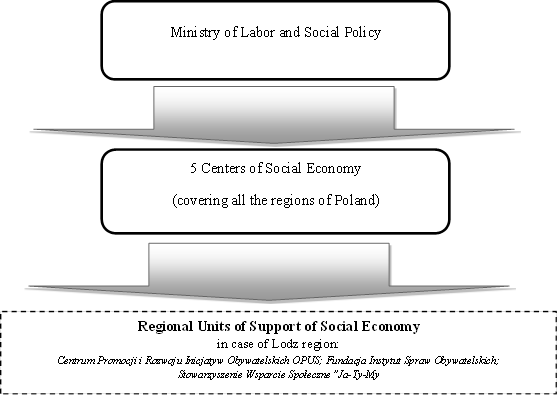Support and cooperation between local authorities and social enterprises is not an easy issue. Usually public support comes together with demands on activities organizations are taking. It means that prize of such support might be connected with losing non-governmental character of social economy entities. So, it is important to find a good balance of such cooperation. Presented examples below of cooperation with social economy on national, regional and local levels show that such balance is possible to be reached.
Development of social economy sector in Poland was strongly determined by Polish history including German, Austrian and Russian occupation in 19th century and period of socialist economy after the second world war.
Three legal forms: associations, foundations and cooperatives have dominated social economy in Poland. Lately, Polish government is appreciating the role of social enterprises and in general social economy entities in solving serious socio-economic issues like social exclusion, unemployment, etc. Because of that in 2014 they have introduced National Program of Social Economy Development, which main aims are:
Since 2009 there is also Integrated System of Support of Social Economy working, which on level of Lodz region operates as shown on scheme below:

Centers of Social Economy are the intermediary between Regional Units and government. They role is to distribute knowledge, support Units. They are also collecting Units’ opinions on new laws or strategical documents. The main aims of Regional Units of Support of Social Economy are:
Regional Units of Support of Social Economy in Lodz region are the natural partner of regional self-government in creating strategies, plans, etc. for supporting development of social economy. They are a kind of representative of social economy entities and counselor to local authorities in area of development of social economy.
Very good example of wise cooperation between local self-government and social economy sector is small town (population 12000) not far from Lodz called Brzeziny. They have to challenge serious socio-economic problems like unemployment connected with lack of relatively big employers and one of the biggest in whole Lodz region air pollution. Town’s mayor Marcin Pluta (since 2010) thanks to his third sector background, understands perfectly how cooperation of local authorities with social economy should look like. What benefit for society might be possible to get in the end. For him, social economy is not the way of solving problems, but the way of minimizing risks.
At the beginning of Marcin Pluta’s first cadency, he decided to communalize operating in town Social Cooperative Communal Service, which allowed him to give this organization employing people at risk of social exclusion in-house orders. He also started using social clauses in most of their public procurement procedures considering employment of local disabled people. His aim is to create closed circuit local economy, that may improve local development.
In close future he is also planning to build cooperation between Social Cooperative Communal Service and commercial employers, to give open market job to best workers of cooperative. This way they would have spot for next citizens at risk of social exclusion in social cooperative. They are also preparing opening of Center for Social Integration and Professional Activity Works – two other social economy entities of inclusive type. In Brzeziny, they have almost finished infrastructure for opening first in Poland Special Zone for Social Entrepreneurship to encourage new social entrepreneurs to come to their town. First initiatives have already appeared like enterprise that gives second life to garbage from local segregation site and shop that picks up from citizens useless for them items that might me still useful for someone (they are selling them for pennies to people in need).
Author: Michał Sobczak

